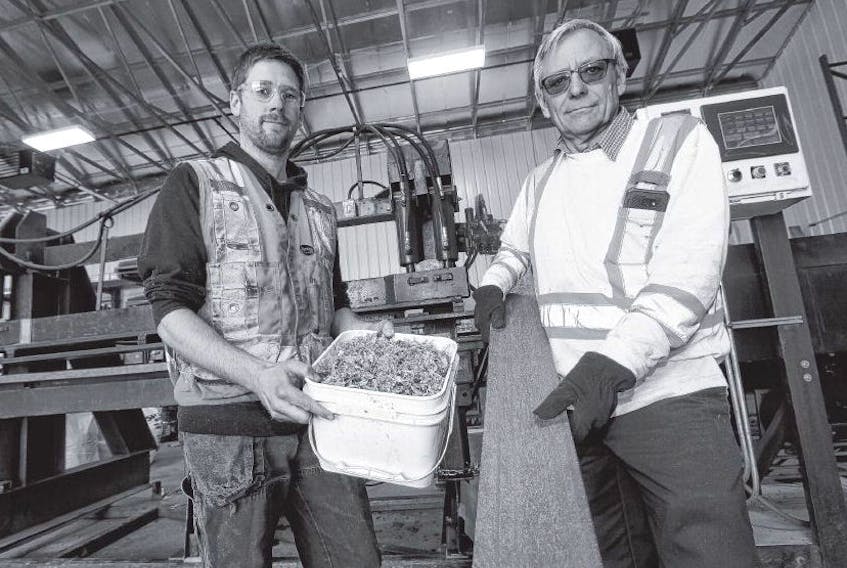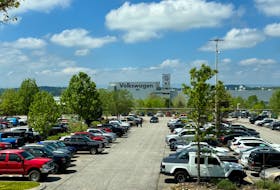Ahhh, those lazy summer evenings languishing on your deck atop a bundle of plastic grocery bags.
It might sound more relaxing if the bags are shredded, melted and repurposed as durable outdoor patio furniture.
That’s in the works from Halifax C & D Recycling and Lake City Employment.
Dan Chassie, co-founder of the Goodwood recycling company, recently acquired an extrusion machine to melt down discarded plastics to create hard plastic forms, primarily boards that can be repurposed to create weatherproof outdoor furniture.
“Dan came to us, the reason behind that is that he had been buying furniture from Lake City Woodworkers for a period of time and he was aware of our social mission, which is supporting people with mental illness on their pathway back to employment,” said Liam O’Rourke, executive director of the non-profit Dartmouth agency that offers free employment services to people 19 years of age and over with an identified mental illness that poses a barrier to education or employment.
“He thought we might be a good partner. When he came to me with a plan to make lots of lumber out of the waste plastic from Nova Scotia, I thought it was a pretty exciting opportunity.”
The plastic furniture business is still in the vision stage.
“How it’s going to look in the end, it remains to be seen,” O’Rourke said. “We don’t want to mix plastic with our wood. We are looking at setting up a second shop to accommodate this kind of new line of furniture which in my mind nicely dovetails with our existing line.”
Lake City will be moving outside the box of its successful woodworking operation.
“All of what we build now is for interiors and it’s made out of solid wood,” O’Rourke said. “We are going to continue on with all of that part of our social enterprise. Building furniture that lasts is what we do and if you build wooden furniture for outside, itdoesn’t matter how well you build it, eventually it’s going to deteriorate. This material gives us the opportunity to have things that stick around forever outside. It’s great.”
It’s a great way to recycle plastics, too, everything from plastic grocery bags to milk jugs, ice cream containers and even shovels.
“We are in the recycling business,” Chassie said. “They build very good quality, solid wood furniture and have been around for over 30 years. I know the company.”
Chassie’s extrusion machine allows the recycler to shred and melt down the plastics to create what he calls pucks. The pucks still contain some moisture, so they are shredded and melted again and extruded in the form that the recycler desires, in this case boards.
“If you want to compare a two-by-six spruce board to a two-by-six plastic board, the plastic board would be three, four times stronger,” Chassie said.
And they can be coloured in the system so they are pretty much ready to use when they emerge from the extruder.
“We’re counting on probably 4,000 to 5,000 tonnes of our own (discarded) plastic but we also want to go after the agricultural bale wrapping. Our plant can easily handle, with one shift, 10,000 tonnes per year.”
The plastics that are contaminated with pieces of aluminum and such can be forged into agricultural products like fence posts.
The boards will eventually be attached with dowels formed out of plastic, too, Chassie said. The end result will be more durable and more expensive outdoor furniture.
“It’s not going to be a $20 deck chair,” O’Rourke said. “It’s going to be a higher-end product but it’s going to be a higher-end product that lasts. The way I look at it is that the quality of this product is going to be similar to a hardwood. We don’t have any prototypes. Having worked with the material a little bit now, it’s got the same weight as hardwood furniture. You are not going to be dealing with deck chairs blowing off your deck. They will be solidly built.”
O’Rourke said they are considering deck chairs, Adirondack chairs, tables, stools, benches and picnic tables, “anything that would sit on your deck or sit on your lawn.”
O’Rourke hopes to be ready to start making some prototypes by the end of May.
Lake City has 33 full-time employees in the woodworking shop, an employment services sector, a computer refurbishment sector and a number of therapeutic programs that are just getting started. The agency supports another 50 people on site and has 260 individuals working in its community employment sector.









